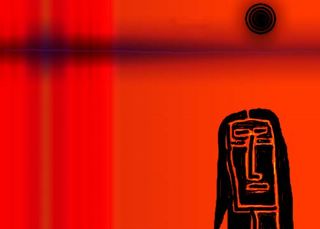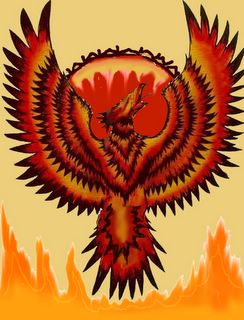James' Night Out
He had a little money; he worked because he liked the walk to the Dairy Queen and back. Especially when it rained the way it did, nowadays. Because all the greats did that: Lester Burnham giving up his job in American Beauty, Kerouac quitting college. And James would tell you this was his reason, with the same ease he would use to click his way around the play lists on his battered ipod. With the same ease he chose his black leather jacket, with the same ease he walked out of his mother’s kitchen at sixteen. It had to be the kitchen, and it had to be June. James knew what he had to have, even if he didn’t know what he wanted: he needed the TV, he needed the ipod, he needed the jacket, he needed the 7th floor apartment in the boondocks of Portland. Walking down the street in his father’s battered drainpipes, eyes to the ground, ear buds disappearing under the shaggy ends of his ears, James had what he knew he had to have. But don’t think I know James better than you, I’ve just been watching more. Follow him, keeping a block in between; find out yourself. But be careful. It’s Thursday night which means drink specials down at Zooropa… and James is on the make. Don’t talk to him, don’t buy him a drink, don’t take him home. Listen though. Put your Nokia off.
“113 Broad Street. Low and warm, this place got an open door like the mouth of the cafeteria lady who knows how much meatloaf you want. It’s one of the few places you can still smoke indoors, and you gotta light up while walking in man, when everyone’s looking at you, you gotta practice. Make like Bette Davis with the eyes, Dean’s wrist action with your light, Bogey’s exhale. Make it look like it’s cancer but damn whatta way to go, because that’s style man, that’s where it’s all at. You know what that Kilgore trout guy, Vonnegut said yeah? “A classy way of committing suicide”. Don’t sit like you own the joint, you don’t. You’re the cat, you prowl man, just prowl, no one’s got nothin’ on ya”
The girl floating at the bar-counter two bodies away only sipped her long island, and waited. She had on a woolen beret and a scarlet mouth, her leggings were neon pink. It had been 20 minutes since James had walked in. She turned so she was facing him, still wearing his leather.
“And you don’t take off your jacket?”
“No darlin’, coz when you do you’re making like an old man doing his taxes while the wife heats up yesterday’s lasagna. On the prowl means you’re alive, ready to run, see, the moment something’s up, so the jacket stays. It’s all in the shoulder’s” He looked up for the first time. “And it’s in your legs. The only reason people watched Saturday Night Fever was coz Travolta was the cat babe, those boots walking, the street was the way he liked his eggs, ya know? His feet finding a way like magnets. Perfect, babe. Just like that” He looked her in the eyes “Perfect”.
The one thing I forgot to mention; don’t talk to James, don’t buy him a drink, don’t take him home. Most of all though, don’t look him in the eye.
She got off the stool, hearing her piper.
“Can I buy you a drink?”
He pulled her down on his lap; she slid down, sitting across him, her legs going on forever, like the 101 out to LA.
“Of course, fuckin’ of course, babe. You don’t ask me these questions, just look at the waitress. Make that the only time you look up from tonguing me”
She stares at his drink. Her hair is black under the beret, which she takes off and puts down on the table.
“But I ain’t tonguing you”
“Not yet. But you will be. Because see that’s the great thing about bars. In the old days you had to win a war and only then would you get the chicks. You had to be all bloody and sweaty, the movers always were. But then they invented bars. It’s a new war, and it’s all about who can prowl and walk away clean. All the booze, the music, the lighting—It’s why Ricky ran that little place in Casablanca. It was the same winning or losing, but clean. The bar is the last great gathering for men ever since one on one combat lost out to bombers, babe. Like the guys singing along to Frankie Valli in the Deer Hunter, ya know… just before they fly off to Nam and go ape shit over there. Like Eastwood walking in with those eyes and every body in that seedy joint knowing that this guys packing .40 caliber balls, Like Frankie in Some Came Running walking into that bar for the first time and seeing that Dean Martin smile, and seeing those Dean Martin hands, Like Quint, mayor Brody and Hooper on that boat in Jaws, drinking apricot brandy, telling stories and showing scars. Now that--”
She kisses him hard, the vodka and tequila finding his jack and coke, the rum getting left behind like always. And his face is glued to hers, hands in her hair. And when they stop, she looks at the waitress, who immediately comes over. She points to her glass and his, and nods. The waitress walks away. He whistles.
“Whoooee. Now that… that’s how it has to be, darlin’. Just like that. Perfect” She takes out a cig, it’s a Virginia Slim. Before it’s even in her mouth, James has it out in his fingers, bending the white stem, crushing the tobacco to the floor panels below.
“And why the fuck did you do that?” She asks, her face quiet.
“Nobody smokes fuckin’ Slims unless they’re the kind of woman whose thighs chill a beer quicker than a meat cooler does. You aint that kind of woman, babe. Always ask the man for a smoke, he owes you that, and he needs to light it like Bogey in Have and to have not, watching Bacall’s face turn warm by the flame”
“So can I have a smoke?”
He lit it for her. And they left together, walking down the street sharing ear buds, singing loudly along to Tom Waits, cussing out Billy Joel for being a rip off, stopping by a Rastafarian with gone eyes who beat his tight drum skin making the street quiver, the leaves shiver up and dance dervishes around in front of him while the people threw their dimes into a box that held his heart and a fetish of Elvis in white. They stared at posters of indie bands with names like Road kill Eaters and Marvin’s Not Gay, they ran over zebra crossings, they ran past Koreans mopping floors behind glass, dancing between the wooden chairs sitting upside down on tables. They kissed in front of the icebox in a seven eleven, and the sad Moroccan who pined for his green-card lover growled when James gave him a 20 for a single pack of Strikes.
They walked, singing and running part of the way, weaving between crack heads and fist fights, always the music and now it was power chords from the 70’s and 80’s, and he air-guitared the sky, falling to his knees, silent screaming to Alice Cooper and Van Halen, while she watched him, lighting up one of his Strikes, silent laughing.
Blondie started playing next and he gave an ear bud back to her, “And this is it, yes YES we gotta dance to this, darlin’” and they danced with solemn faces, knee to knee and he was smiling because this was just like Thurman and Travolta in Pulp Fiction, all in black silhouette and soft lighting under the one street lamp. They kissed like that scene out of Natural Born Killers, she clung to him like a ballad by Heart, all big eyed and trashy, but innocent here where there were no tube lights, no anxious brother hunting a Gilbert Grape up a dark hill, and he laughed into her mouth, and his hands were under her thighs, and she hopped her legs up, wrapped them around him, and they kissed like there was no oxygen in the cold street.
“These stairs babe, these stairs are like old scrolls and red-wood stumps, like grainy Wurlitzer records playing the old jazz; there’s a story in every plank, every stain and mark on this wall, every gun-shot some Chicano badge of courage, stairs are where it’s at babe, like Demi Moore breaking that glass jar with the penny, rolling down the splinters when Swayze’s a ghost, ya know? It’s where people tell the stories, like it’s the 1920’s, like young Corleone’s wife with Sonny outside in the evenings with her chair, just like that”
And only when they kissed then, James leaning her over the banister, did they hear the sound coming from 403, whose door was open, weak fish-eye light glowing in the crack. James pushed the door open quietly and by the light of a 20-watt bulb under a green lampshade, there stood an old man, singing along softly to Nina Simone on his old Victrola. They watched him shuffling his feet around the matchbox space between his couch and the toaster, with an old silk dress in his arms.
… My love is like
The wind
And wild is the wind
Give me more
Than one caress
Satisfy this
Hungriness
Let the wind
Blow through your heart
For wild is the wind
The room had the watery green look of a pool at night, porthole lights casting shadows of the swimmer against the sleeping blue tiles. The room was cool, and James walked in and sat down on the couch watching, all rapt.
You...
Touch me...
I hear the sound
of mandolins
you...
Kiss me...
With your kiss
my life begins
you’re spring to me
All things
to me
The old man raised his eyes and saw her. Still shuffling in time, he placed the dress tenderly, careful like a gentleman with a stubborn bra-hook, next to James on the couch. Shuffling back to the girl, he held out his hands with a little bow, and they danced like that, with Simone’s voice like grape wine and a grotto.
Don’t you know you’re
Life itself
Like a leaf clings
To a tree
Oh my darling,
Cling to me
For we’re creatures
Of the wind
And wild is the wind
So wild is the wind
And their faces were quiet, cheek to cheek, and it was solemn, like Cary Grant as Nicky Ferrante waiting at the top of the Empire State for Deborah Kerr to show up in An Affair to Remember, and he doesn’t know about her accident, just stands there in the black and white of night and watches from the closest thing to heaven in New York city. And when the song ended the old man smiled and she kissed his forehead, and they left without a word, James throwing a last glance of the old man next to the dress, whose eyes were closed like an old catfish, with lights from the street outside flitting across the ceiling like dolphins, like angels up on the surface.
And her mouth was no longer scarlet, and the ear buds were no longer hidden under his shaggy hair. Instead they tangled and became hard little knobs under her back, as he pulled off her sweater, and left her leggings on. As he struggled with his shoes, she leaned over and turned the radio on, it was 3:13am and there was Jazz, Yusuf Lateef blowing his horn. He froze and looked at her.
“Why’d you do that that, darlin’?”
“Because there should always be music”
And James threw back his head and laughed so hard on the floor above James’ laughing throat, a Mexican family’s youngest child turned uneasily in his sleep, seeing visions of the holy virgin accepting a freshly carved heart on the roof of an Aztec Teccalco. The child whimpered.
“Like that darlin’, just like that… to the jazz, that alto horn he’s blowin' it was meant to be drunk in with your body, and your sounds ya know?”
The Jazz was still playing when James leaned over for the bottle of cheap wine he had snagged from a convenience store, and the noises out of his throat were laughing and deep, a gurgling stream. He knelt down on the sheets in front of her, and held her face in his hands, smiling. “This is how it gotta be, see? Like Jerry Maguire meets Last Tango in Paris, you know the look on Paul’s face when he looks at her and says, Get the Butter? That kinda face-to-bone kinda hardness and need, and that conversation they have in bed, Jeanne and Paul, and she tells him about the child prodigy pianist she loved because he could play with both hands, and Paul says he bet he did with that look that you just know what he means : like that, just like that… babe”
And they kissed and James was tender because he remembered the old man singing along to Nina Simone, the empty dress in his arms. “That dress” he rasped, into her open mouth, “that dress was all he had left of her, see babe? And he held on… hold on… right there, just like that darlin’… Perfect”
And then they walked the eight streets down to the bank of the Willamette, his arm around her waist, while he sang along to the Rolling Stones.
“See darlin’, this is the kind of river the Boss sang about in that song… We go down to the river, and into the River we dive… it’s big and wide and living, that’s what makes a river different from a bay see, and you dive in and you’re clean again, you forget again. Damn… Bruce Springsteen, he got ‘it’, ya know…” They sat down, and it was quiet. He took out his switchblade, and bounced the moonlight off the clean metal like it was happy juju, like zydeco playing in June down at the Waterfront blues festival. “Rivers make a man think of women and death, babe, it’s why rivers are so personal, it’s why a man will always bring a woman to water when he wants to sleep with her the first time.”
She took out Slims and lit up. He stared at her.
“Now why’d you go do that, darlin’. What did I tell ya about smokes?”
She looked at him straight in the eye, and James thought how she had Bette Davis eyes, how she could start hurricanes with those eyes, like Storm from X-Men.
“So it’s either love or death?”
“A fuck or death, yeah”
She threw her cig into the water, and he smiled as they kissed, and her hand was over his, taking the blade from him. He held her as she gently played the flat cold steel against his forehead, his cheek. “I never watched any of those movies”.
“I know darlin’, but you will”
And James stood there like a young priest, bright-eyed and a little drunk, and the sky was cold grey like it is before every dawn here at the water’s edge. His arms cradled her like a bouquet of fragile vertebrae, slender legged, fragile pale skin. She was his offering to the bright light, the sun. The cold steel was at his throat as he hummed Tom Waits—
And I wish I was in New Orleans, 'cause I can see it in my dreams,
Arm-in-arm down Burgundy, a bottle and my friends and me
New Orleans, I'll be—
There. The blade at his throat, right there. And her mouth was scarlet, and her feet steady as she picked her way up to union station to catch the first greyhound out; maybe now she can be free. James stayed there, his eyes beautiful and vacant as the sun came up, playing plastic bags and silvered beer cans across the glass of his sight while Tom Waits sang a hymn to the morning. American Beauty. All the greats did that: Lester Burnham giving up his job, Kerouac quitting college. James was like that, and maybe it’s better you don’t listen, anymore.















